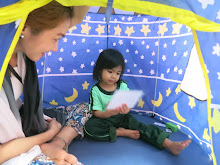As an educator, I do spend enough (sometimes more than enough) effort in preparing the activities for my classes. I handle children as young as 18 months up to 5 years old, currently and all groups are unique and very interesting.
I have my personal beliefs in being an educator. From my past training and experiences, curriculum is as important as breathing in our field. Without it, we simply can't survive our day, or worst, we just have no direction and "teaching" is less purposeful. I have designed curricula myself and was able to successfully carry out each written plan. I'm quite obsessed at following routines. That's what curricula are made of after all, for us to have a sense of goals and objectives and a sense of standard to follow.
Curricula are sometimes biased
In spite of that, I have slowly come to a sense of rebirth that some curricula are totally biased (at least most of the time) if it is done without careful observation based on child interest. Most are teacher-centered, not child-centered. I do understand if some (or most) educators will disagree as I know the painful effort we invest to accomplish things like lesson plans. But when should we stop making our own plans on what we what our child to "learn"? The answer is NOW.
Expect the unexpected
I always have this encounter with my youngest class. They always surprise me with their uncanny reactions to what has been prepared for the day! It's interesting how terrified they become with a simple mask that's posted on the board for them to decorate!
Here's what happened:
I prepared masks for each one of them to decorate however they like it. The plan was to make them spread some glue, sprinkle some glitters, post some tiny papers around it, fill it with colors and just be creative (Teacher-centered-not good). Perhaps (I was ready for this) crumple the mask or simply tear it. So I came to class excited and ready to give away their materials!Oh boy! Have I totally lost my senses and made them feel terrified with my superhero mask upon entering the room?!?! Yes, kind of. They got scared of me. I was excited. I had a very huge smile. They were horribly scared. They started to get cranky and cried.
Educator's role
What's an educator to do when your plan just didn't end or should I say, start up the way you anticipated it? Plan B. switch hats and just guide them on something that may spark their interest. If I insisted on my planned activity because that's what has been written on the curriculum, then I fail as an educator. Being compliant to your plans is one thing, but insisting on something that did not interest them is another thing. It is like forced-feeding a child that is already very upset yet you don't stop the feeding. Isn't it disgraceful? That's what happened in one of my classes. In fact, it happens to all teachers too. But the trick is be observant and intentional. My role as an educator is not to "teach" them what I think they need to learn. My role is to observe and guide them, to set up invitations to learning that is of their interests, not mine, not the ones being planned, and to finally trust them to lead the way.
So instead of masks, they excitedly rolled up the bottled water filled with food coloring,
slammed their body on it pretending it to be a bowling ball (dizzy play),
while another one was keeping herself amused with her shadows !!
and color mixing always saves the day! They're happy. I'm satisfied. They learn in a non-threatening way. They explored based on what interests them and they got engaged because they chose their own activity not what has been planned.
So here's my take on curriculum, we made them, teachers do prepare them (teacher-centered). But sometimes (in fact, it's always), it's just not right.
Learning is limitless
In the area of learning, we can't contain it and give limits to it by telling a child what they need to lear, dictating what they should explore. I value every single thing a child does in child care centres, from shaking liquids to pouring sand on the floor. Isn't it amazing how some things that look interesting to us aren't always as interesting to them? How a simple leaf can provoke their curiosity?
Embracing changes
I have an unrelenting faith in today's early childhood education, and I have seen a massive (positive) change in this generation compared to mine. In spite of the rigid practices in teaching during my time, I came to be who I am today. Some teaching methods that are being practiced in other countries now are slowly gaining popularity and in fact giving impact to early childhood industry. As time evolves, we can't always stick to what has been, let's embrace change and be open to new challenges in the field of early childhood education.






No comments:
Post a Comment